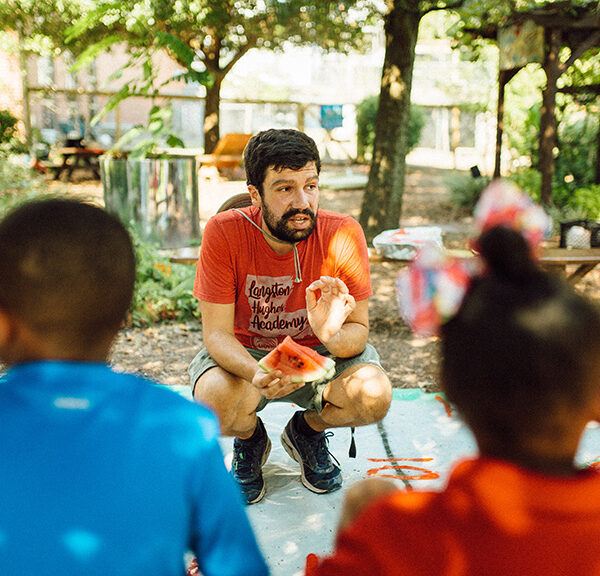
“For farm to early care to really work, you need cross-sector partners working together. You need people from the food systems, people from early care, people who are at these state agencies, like departments of agriculture, education and health and human services – they all have to be at the table.”
Arlene Enderton, Iowa State University Extension and Outreach
Farm to early care and education is a foundational program that connects young children with local food production by bringing farm-fresh food into early care and education settings and offering experiential learning with edible gardens, cooking and tasting fresh fruits and vegetables. Farm to early care and education initiatives work across systems, linking education, health and agriculture to support children’s cognitive, physical and social-emotional development; improve community nutrition; and build sustainable local food systems.
Successful farm to early care and education programs bring together a diverse group of community and government partners in education, health and agriculture with the purpose of addressing systemic inequities, especially related to race and income. Increasingly, state coalitions are forming to embrace farm to early care and education as a win-win-win strategy that increases access to healthy foods, enriches early learning environments and helps local agriculture prosper.
Coalitions can also support high-quality early learning by leveraging farm to early care and education initiatives to achieve states’ quality rating and improvement systems (QRIS) and other provider standards. Highlighted below are examples of the work of state coalitions from the W.K. Kellogg Foundation’s five-year, five-state investment in Georgia, Iowa, North Carolina, Pennsylvania and Wisconsin, as well as other states like Minnesota that are leading the way.

Comprehensive farm to early care and education model made possible through Wisconsin coalition.
Kids Forward, Rooted and Parenting Place have been working together for the past five years to implement a comprehensive farm to early care and education model that includes a community of practice for early care and education providers and promotes nutrition security for young children. Kids Forward serves as the central coordinator and is focused on advocacy and policy change. Rooted is the hub for creating resources and providing training for providers, while Parenting Place is the on-the-ground partner working directly with centers on a daily basis. Wisconsin’s success is also connected to a broader state effort with the Wisconsin Early Learning Coalition, Wisconsin Department of Health Services, Wisconsin Department of Public Instruction, Wisconsin Department of Children and Families, Wisconsin Early Childhood Association, UW-Madison Extension, Special Supplemental Nutrition Program for Women, Infants, and Children (WIC) and many more. As part of their efforts to enhance quality early learning environments, the coalition adopted GO NAPSACC, which includes a self-assessment for early care and education programs, action planning tools and a resource library of tips and best practices.
“The most important piece is having a backbone organization who holds the responsibility of a working group or coalition together. This work is so important and often not funded ... having a strong anchor to carry the work forward takes a lot of work and often goes unnoticed, but it creates consistency and increases the quality of coalition building.”
Vanessa Herald, Center for Integrated Agricultural Systems
Pennsylvania partners implement farm to early care and education to support a just food system.
The Food Trust; Pennsylvania Head Start Association; Pennsylvania Departments of Agriculture, Education and Health; and about 30 other partners formed the Ready, Set, Grow task force and regional learning collaboratives to expand farm to early care and education across the commonwealth, with the goal of advancing racial equity. Key strategies have been integrating farm to early care and education into Pennsylvania’s quality rating system, Keystone STARS, offering early care and education providers incentives for purchasing locally sourced foods and establishing a mini-grant program for providers to start up and reach more communities with farm to early care and education initiatives. Coalition partners also helped push for Pennsylvania to become the first state in the nation with a dedicated farm bill that includes farm to school funding for pre-kindergarten to fifth grade programs.
Minnesota brings together early care and education providers, nonprofits and farmers of color.
The Community Action Partnership of Ramsey & Washington Counties Head Start Program, Hmong American Farmers Association and Institute for Agriculture Trade Policy collaborated to launch a successful farm to Head Start initiative. The partners aligned around shared values to design the initiative and keep them unified in the face of later hurdles. Since 2014, the initiative has been expanding access to culturally relevant, fresh healthy foods and exploring deep connections between food and cultural traditions for communities disproportionately affected by diet-related disease. These and other statewide coalition partners recently mobilized to secure $500 million in American Rescue Plan Act (ARPA) funding for early childhood programs, including stabilization grants and facility upgrades.
Our children cannot wait.
View and download this policy brief
Key ingredients of successful state coalitions
Having a nonprofit organization or interagency state coordinator that is fully funded is critical to driving the work of the coalition.
To be successful requires partners across sectors – early care and education, health, education and agriculture – to be involved.
Early childhood education providers must be meaningfully engaged to understand barriers and develop workable solutions.
Getting partners to align around shared values provides the foundation for farm to early care and education programs.
States must make farm to early care and education a priority for state agencies to participate, as well as support enabling policies and funding.
Resources are essential to fund the coordinator and coalition partners in carrying out the work.
Discover more policy briefs about Farm to Early Care and Education
The Promise of Farm to Early Care and Education
Opportunities to Improve Farm to Early Care and Education Procurement
Resources to Grow the Farm to Early Care and Education Movement
Investing in Farm to Early Care and Education
This guide is for funders and all who seek to support farm to early care and education programs that nourish children, families and communities.
The W.K. Kellogg Foundation works to strengthen opportunities for the health and well-being of children, families and communities through investments in equitable food and learning systems. Over the last five years, the foundation has invested $18 million to support National Farm to School Network, Policy Equity Group and state partners in building a vibrant network of farm to early care and education programs and sharing best practices and tools for expanding the model across the country.


Comments